Share
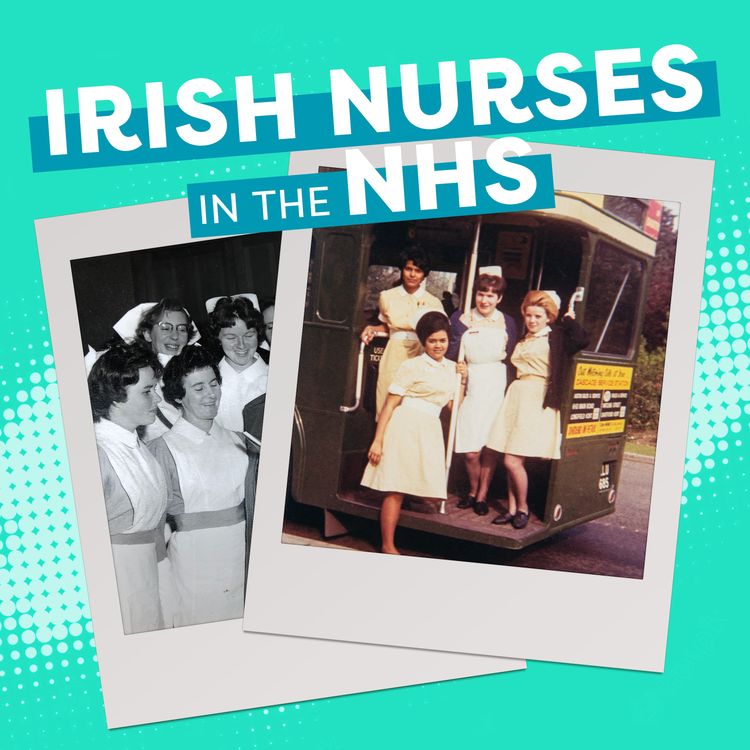
Irish Nurses in the NHS
Belts and Buckles
Season 1, Ep. 6
•
As Britain was emerging from World War 2, the nurse's uniform played a vital role in the public consciousness as a motif of authority and rank that was based on military discipline. It inspired public trust and patient confidence, the NHS was in full mobilization fortified by the tens of thousands of Irish nurses who were recruited into the ranks of frontline healthcare in Britain
Episode 6 of the Irish Nurses in the NHS Podcast Series, we hear the story of how the nurses' uniform was a dominant force that placed the nurse front and centre in the NHS in the early years and how the iconic image of the nurse's uniform has evolved over the years in 'Belts & Buckles'
More episodes
View all episodes
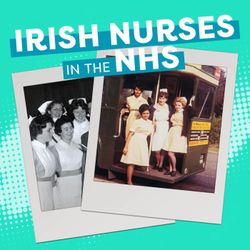
10. Making Their Mark
32:53||Season 1, Ep. 10In this final episode of the Irish Nurses in the NHS, the women describe how their nursing careers developed after training and how they made their mark on Britain's NHS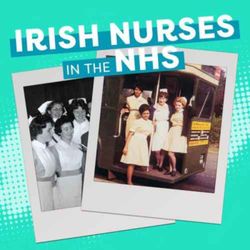
9. Nurse's experiences of anti-Irish discrimination in Britain
26:26||Season 1, Ep. 9In this episode, we hear the first-hand accounts and negative experiences faced by the nurses, as Irish migrants in Britain and especially at the height of the Northern Ireland Troubles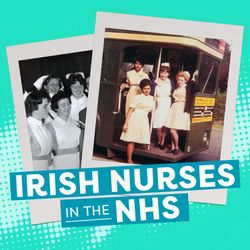
8. Perception of Irish Nurses Working in Britain
15:06||Season 1, Ep. 8Marking St Brigid's Day, we hear in this episode why Irish nurses were perceived as the steadfast embodiment of the caring profession that was at the heard of Britain's National Health Service. During the 19th and 20th Centuries, swathes of Irish - born citizens travelled across the sea to find opportunity in Britain. While many depictions of Irish migrants were derogatory, the figure of the Irish nurse remains esteemed. Hardworking and friendly, Irish nurses were often well receivedIrish families in the 1950s, 1960s and 1970s were generally larger than today; so it wasn't unusual to have at least one nurse in the Irish family unit, however, lack of employment and difficulty in getting a nurse training place in Ireland drove many young women and men across the Irish Sea and into the arms of Britain's National Health ServiceWe are now at the halfway point in the Irish Nurses in the NHS story where we are following the trajectory of the lives of these nurses, how they were recruited into the NHS, leaving home, stories of life in the nurse's home, the uniform, nurse training, the wards and patients. But how were they perceived as Irish nurses in Britain? What was the X Factor that helped to create the image of the Irish nurse as indefatigable?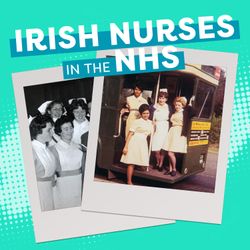
7. Caring for the Patients
20:29||Season 1, Ep. 7Launching Episode 7 of the Irish Nurses in the NHS Podcast series on Women's Christmas; known as Nollaig na mBan in Ireland, we hear about the different hospital patients that the nurses cared for and how these experiences helped shape their future nursing careers.
5. Home Away from Home
17:10||Season 1, Ep. 5Episode 5 of the Irish Nurses in the NHS Podcast Series, we hear the story of how the nurses' home was central to the recruitment and retention of tens of thousands of Irish nurses in to the NHS. The nurses in this episode recall the time when they lived in the nurses' home and how it felt like they were living in home away from home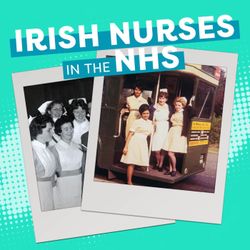
4. The Bright Lights of London
18:41||Season 1, Ep. 4Episode 4 of the Irish Nurses in the NHS Podcast Series looks at what the social life was like down through the decades from the early 50’s and the Teddy Boys through to the Swinging 60s that gives way to the 1970s Hippy Flower Power era and how the Irish girls still managed to have a social life of sorts despite the unstable political situation existing between Britain and Ireland that defined the 1980s.Credits: Music: ‘Resonance’ by Amala Reidun Schlesinger & Paul de Grae
3. The Liverpool Story
30:14||Season 1, Ep. 3This episode of the Irish Nurses in the NHS Podcast Series is dedicated to the Irish nurses who migrated to Liverpool. We hear the stories about how they came to settle in the Merseyside city nicknamed the ‘Capital of Ireland’. We hear about the journey over to Liverpool on the cattle boat – Annie was only 17 years old when she took the cattle boat to Liverpool; the "Oh yes, loads of cattle on them, very little people on them but lots of cattle on them." We meet John, who is in his 90s, who followed his family to Liverpool and pursued a career in nursing in his early 20s. He speaks of the importance of the Irish Community Centre in bringing second and third generation Irish together; "I always say if it wasn’t for the second generation Irish, we wouldn’t have the club because they’re more active in organising." Other voices from the Liverpool story speak fondly about discovering the ballroom of romance upstairs in the Liverpool Odeon. Credits:Music: ‘Resonance’ by Amala Reidun Schlesinger & Paul de Grae
2. Becoming a nurse
23:14||Season 1, Ep. 2This episode of the Irish Nurses in the NHS Podcast Series looks at what it was like to become a nurse in the NHS. Five nurses share with us their recollections of the highs and lows of their training. Mary, one of the nurses interviewed on this episode, talks about her motivations around nursing and how she refused, against her mother’s wishes, to train in a Catholic hospital, run by nuns in Ireland. She arrived not long after the end of World War II and the birth of the NHS. Her training was regimental yet she remembers some comedic moments she holds dear from her time training. Four more voices bring their stories of adjusting to their new lives and their memories of their training. Credits:Music: ‘Resonance’ by Amala Reidun Schlesinger & Paul de Grae